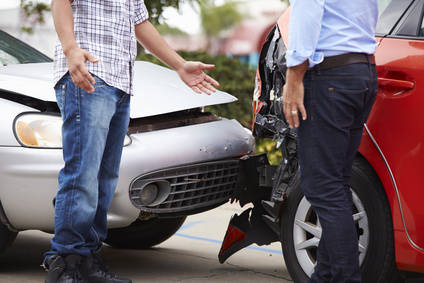 For most people, driving is a necessity. While car accidents are relatively common, it’s often difficult to know exactly what to do when you’re personally involved. There is usually so much going on that the situation can quickly become confusing and intimidating. In order to ensure you are protected in all circumstances, it is important to follow specific procedures immediately after an accident. Here is a checklist to help you know what to say and do if you are involved in a traffic accident.
For most people, driving is a necessity. While car accidents are relatively common, it’s often difficult to know exactly what to do when you’re personally involved. There is usually so much going on that the situation can quickly become confusing and intimidating. In order to ensure you are protected in all circumstances, it is important to follow specific procedures immediately after an accident. Here is a checklist to help you know what to say and do if you are involved in a traffic accident.
* Remain at the Scene: No matter how minor the collision may appear to be, it is important to remain at the scene until an officer releases everyone. This is especially true if there are injuries or fatalities associated with the accident. You may face serious criminal penalties if you are charged with a hit-and-run-violation.
* Check on the Drivers and Passengers: Assuming you are not hurt, make sure everyone involved in the accident is not seriously injured. Give medical attention to those who need it. If the injuries are catastrophic, wait for qualified medical help unless the person is in immediate danger.
* Keep an Emergency Kit in the Glove Box: You should have a pen and paper readily available to take notes, and your cell phone should be charged so you can call your family, the insurance company and the authorities. If your phone doesn’t have a camera, put one in the glove box so you can take photos of the accident. Your insurance card and registration should always be kept in a convenient place, and cones or emergency flares can be very helpful in an accident.
* Discuss Accident Details with the Police: In a chaotic situation, people have a natural tendency to want to talk about what just happened. However, it is important to discuss accident details exclusively with the police while taking care to avoid admitting liability or fault.
* Exchange Insurance Information: After an accident has occurred, it is customary for those involved to exchange the following information: name, phone number, address, insurance company policy number, license plate number and driver’s license number. If the name on the license differs from the name on the insurance card, try and establish the nature of the relationship between the driver and the owner of the car.
* Get a Police Report: While your interaction with the other party may be cordial, sometimes stories change after the fact. Without a police report, insurance companies are left to evaluate claims that are often conflicting. Even in a minor accident, obtaining a police report is a critical tool in establishing liability.
* Call Your Insurance Agent: Your insurance card should include a phone number for reporting an accident. Collect your thoughts and be as detailed as possible in explaining the incident. Fill out all the associated forms completely. Make sure your insurance company receives a copy of the accident report. Depending on who is at fault, it may be necessary to hire an attorney to recover reasonable damages if the other party’s insurance company is uncooperative.
Stay Calm
Above all else, stay calm and think clearly. If the accident doesn’t involve injuries, you can rest easy knowing your vehicle will be repaired to factory standards. Everyone is involved in a car accident at some point, so maintain perspective in the face of this kind of adversity.
